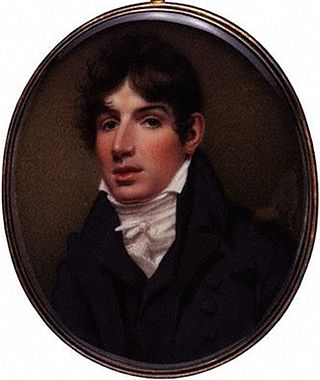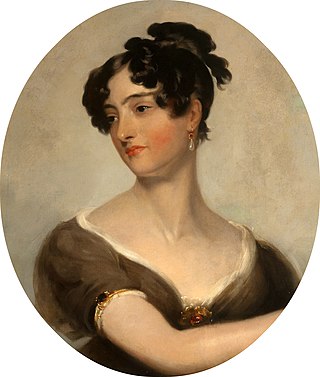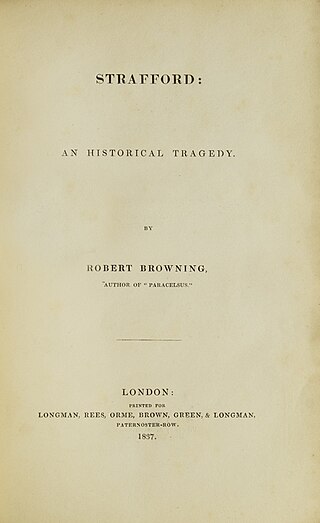This article contains information about the literary events and publications of 1805.

Robert William Elliston was an English actor and theatre manager.

The Surrey Theatre, London began life in 1782 as the Royal Circus and Equestrian Philharmonic Academy, one of the many circuses that provided entertainment of both horsemanship and drama (hippodrama). It stood in Blackfriars Road, near the junction with Westminster Bridge Road, just south of the River Thames in what is now the London Borough of Southwark.

The University Wits is a phrase used to name a group of late 16th-century English playwrights and pamphleteers who were educated at the universities and who became popular secular writers. Prominent members of this group were Christopher Marlowe, Robert Greene, and Thomas Nashe from Cambridge, and John Lyly, Thomas Lodge, and George Peele from Oxford. Thomas Kyd is also sometimes included in the group, though he was not from any of the aforementioned universities.
Daniel Egerton (1772–1835) was an English actor.

The Old Orchard Street Theatre in Bath, Somerset, England was built as a provincial theatre before becoming a Roman Catholic Church and since 1865 has been a Masonic Hall. It is a Grade II listed building.

Henry Siddons was an English actor and theatrical manager, now remembered as a writer on gesture.

Harriet Siddons, sometimes known as Mrs Henry Siddons, was a Scottish actress and theatre manager.

Canon Sydney Robert Elliston MA was a journalist, vicar, and canon of Ripon Cathedral. Two of his brothers were William Rowley Elliston and George Elliston MP. He was involved with the formation of the Ripon Diocesan Board of Finance in 1913, and was its secretary from 1914 to 1935. At his funeral it was said of him that, "The diocese of Ripon owed a great debt to the work of Canon Elliston in laying down sound principles of Church finance." While looking after the finances of Ripon diocese, he was at the same time vicar of one of north-east England's Barber churches: the Church of St Thomas the Apostle, Killinghall (1880), designed by William Swinden Barber.
John Alais was a skilled engraver working in London and Argentina.
The Drummer is a 1716 comedy play by the British writer Joseph Addison, also known as The Drummer, or, The Haunted House.
The Vindictive Man is an 1806 comedy play by the British writer Thomas Holcroft.

Strafford is an 1837 tragedy by the British writer Robert Browning. It portrays the downfall and execution of Lord Strafford, the advisor to Charles I shortly before the English Civil War.

Adelgitha is a tragedy by the British writer Matthew Lewis. It premiered at the Theatre Royal, Drury Lane on 30 April 1807 having originally been published the year before. The cast included Henry Siddons, Robert William Elliston, George Frederick Cooke and Jane Powell while the incidental music was composed by Michael Kelly. It was one in a run of Gothic plays Lewis produced following the success of The Castle Spectre. The play is set in Otranto around 1080 which was ruled over by Robert Guiscard following the Norman conquest of southern Italy.

The Curfew is a historical tragedy by the British writer John Tobin which was first published in 1807, three years after the author's death. It was staged by Richard Brinsley Sheridan at the Theatre Royal, Drury Lane in London premiering on 19 February 1807. The cast included William Barrymore as Hugh de Tracy, John Bannister as Robert, Henry Siddons as Bertrand, William Penley as Walter, Robert William Elliston as Fitzharding, Edmund John Eyre as Philip, Jane Powell as Matilda and Maria Duncan as Florence. It appeared at the Crow Street Theatre in Dublin on 1 April the same year. It is set during the Norman era.

Swedish Patriotism is an 1819 stage melodrama by the British writer and actor William Abbot. It premiered at the Theatre Royal, Covent Garden on 19 May 1819. The London cast included Daniel Terry as Colonel Walstein, Abbot as Captain Albert, Maria Foote as Ulrica, John Liston as Walter, Charles Connor as Colonel Langstorff and Daniel Egerton as Count Cronstedt. It then appeared at the Park Theatre in New York on 1 December 1819 with Robert Maywood as Walstein.
The Siege of St Quintin is an 1808 historical play by the British writer Theodore Hook. It is inspired by the 1557 Battle of St. Quentin. Its theme of a past Anglo-Spanish victory over the French was in line with British support for modern Spain in the Peninsular War following its invasion by Napoleonic forces the same year. It premiered at the Theatre Royal, Drury Lane on 10 November 1808. Revisions were made by Richard Brinsley Sheridan and his son Thomas Sheridan, part of the management of Drury Lane. The original Drury Lane cast included Robert William Elliston as Count Egmont, James William Wallack as Theodore, John Braham as Everard, Vincent De Camp as Bertrand, Harriet Siddons as Adriana, John Henry Johnstone as Sir Leinster Kildare, Walter Maddocks as Captain McIntyre, William Penley as Jack, Thomas Cooke as Sergeant Sturdy, Matilda Ray as Rosa De Valmont and Charlotte Tidswell as Margaret. Accompanying music was composed by James Hook.
The Land We Live In is an 1804 comedy play by the British writer Francis Ludlow Holt. It appeared at the Theatre Royal, Drury Lane in London on 29 December 1804. The cast included Dorothea Jordan as Lady Lovelace, Richard Wroughton as Sir Rowland English, William Powell as Sir Edward Melville, Robert William Elliston as Young Melville, William Barrymore as Sir Harry Lovelace, Vincent De Camp as Harcourt, John Bannister as Dexter, Ralph Wewitzer as Peter, Charles Mathews as Robert, John Henry Johnstone as Larry MacBoof, William Chatterley as Waiter, Maria Kemble as Miss Betty, Sarah Sparks as Mrs Doublecharge, Harriet Mellon as Polly, Charlotte Tidswell as Susan.

Faulkener is an 1807 historical tragedy by the British writer William Godwin. The play premiered at the Theatre Royal, Drury Lane on 16 December 1807. The cast included Robert Elliston as Faulkener, Henry Siddons as Stanley, Harriet Siddons as Lauretta, Jack Palmer as Benedetto, William Powell as Orsini and Jane Powell as Arabella.

Rugantino is an 1805 melodrama by the British writer Matthew Lewis. An afterpiece, it was originally staged at the Theatre Royal, Covent Garden on 18 October 1805. It was inspired by the 1801 French play L'Homme à Trois Visages by René-Charles Guilbert de Pixérécourt. The original cast included Charles Murray as Andreas, Duke of Venice, John Liston as Meme, William Abbot as Poole, Henry Erskine Johnston as Rugantino and Isabella Mattocks as Camilla. It premiered in Ireland at Dublin's Crow Street Theatre on 26 January 1807. It was revived at Drury Lane in 1820 with a cast featuring James William Wallack as Rugantino, Thomas Cooke as Contarino, William Oxberry as Memme, John Pritt Harley as Stephane, Walter Maddocks as Harald, Sarah Sparks as Camilla and Charlotte Tidswell as Bettina.













